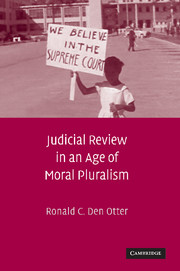Book contents
- Frontmatter
- Contents
- Acknowledgments
- Introduction
- 1 Public Justification and Constitutional Theory
- 2 Freedom and Equality in Constitutional History
- 3 The Challenge of Public Justification
- 4 Competing Conceptions of Public Reason
- 5 Constitutional Public Reason
- 6 The Limits of Public Justification
- 7 Standard Objections to Public Reason
- 8 Easier Cases
- 9 Harder Cases
- 10 The Case for Judicial Review
- Conclusion
- References
- Index
- References
4 - Competing Conceptions of Public Reason
Published online by Cambridge University Press: 17 December 2010
- Frontmatter
- Contents
- Acknowledgments
- Introduction
- 1 Public Justification and Constitutional Theory
- 2 Freedom and Equality in Constitutional History
- 3 The Challenge of Public Justification
- 4 Competing Conceptions of Public Reason
- 5 Constitutional Public Reason
- 6 The Limits of Public Justification
- 7 Standard Objections to Public Reason
- 8 Easier Cases
- 9 Harder Cases
- 10 The Case for Judicial Review
- Conclusion
- References
- Index
- References
Summary
In the previous chapter, I tried to show how a concern about public justification emerges when the state legislates on the basis of reasons that reasonable people may be justified in rejecting. In exercising the power of judicial review, the judge assesses the quality of the reasons that the state has offered on behalf of the law in question. The less controversial the underlying reasons, the more publicly justified, and thus legitimate, that law is likely to be. After taking into account a presumption of freedom and equality, if the judge concludes that a reasonable person would accept those reasons, then the law is constitutional. If a reasonable person would reject the reasons, then the law is unconstitutional. An ideal of public justification serves a normative standard for the use of public reason. However, those who adhere to this ideal are divided over how to draw the line between public and nonpublic reasons and whether deliberators may rely on nonpublic reasons in certain situations. As a consequence, there are “competing conceptions of public reason.” In this chapter, my aim is to sketch the debate about public reason, to spell out the similarities and differences of the three basic paths to public justification, and to identify some of the main questions about how such justification can be accomplished.
THE THREE CONCEPTIONS
According to Lawrence Solum, there are three basic principles of public reason: “laissez-faire,” “exclusion,” and “inclusion.”
- Type
- Chapter
- Information
- Judicial Review in an Age of Moral Pluralism , pp. 109 - 138Publisher: Cambridge University PressPrint publication year: 2009



